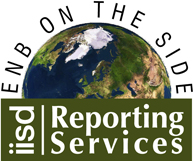 |
||
|
published by IISD, the International Institute for Sustainable Development
in cooperation with the UNDP Secretariat |
|||
|
Special Report on Selected Side Events at the Fourteenth Session of the Commission on Sustainable Development (CSD-14)
|
|||||
| 1-12 May 2006 | United Nations Headquarters, New York | |||||
 |
 |
|||
 |
||||
A BRIEF ANALYSIS OF THE SIDE EVENTS AT CSD-14
|
Consistent with other international environment and development regimes such as the UN climate change and biodiversity processes, the Commission on Sustainable Development has witnessed a rapid rise in the quantity and quality of events held in conjunction with its annual meetings. Indeed, many participants now appear to believe that such side events have become as important as the “main feature” of CSD’s official schedule. Following the four themes contained within CSD’s 2006/7 thematic cluster, the more than 65 side events mostly centered around the interrelated issues of energy, industrial development, air pollution, and climate. ENERGY ISSUES In the lively discussions that often followed panel presentations on the subject, the debate over whether to focus on the introduction of renewable technologies such as solar power inevitably emerged. The bulk of presenters maintained that the short term focus should be on providing access to energy, and that this may very well require fossil fuels, such as liquid petroleum gas. However, many donors have expressed their preference for funding climate-friendly technologies, pointing out that innovations such as solar and improved biomass stoves are less dependent on ongoing external fuel inputs, and hence less subject to the volatility of fuel prices. Several participants from both developing and developed countries objected strongly to this stance, saying that the plight of the poor merits immediate assistance, and that having this hinge on the adoption of climate-friendly technology is immoral. Related to this debate was the definition of what “renewable” actually means, and particularly whether large-scale hydropower projects that involve widespread flooding and displacement should be included within this category. HEALTH AND GENDER EQUITY Energy efficiency also figured prominently within the events, mostly with regards to seizing the “low-hanging fruit” by replacing obsolete appliances and reforming the transport sector, with the greatest gains to be had in the developed world. This was part of a larger discussion of sustainable production and consumption, and the need to decouple economic prosperity from energy consumption. THE ROLE OF THE PRIVATE SECTOR Just as significant, however, were the issues absent from the CSD official agenda that were addressed in several side events. It is probably no coincidence that some of these events were among the most well-attended of the entire two weeks. THE NUCLEAR DEBATE UN REFORM Finally, a number of participants remarked that the high quality of the research projects presented at many CSD-14 side events is not currently reflected in the shelf-life or attention they are given by decision makers. Some felt that this could be due in part to the sheer volume of literature and other materials that is generated and distributed, and the number of events held simultaneously during the course of the meeting. Whether this is true or not, it seems clear that the growing interest shown in CSD’s side events may finally be generating recognition for the informal dialogue and knowledge sharing that many seem to feel is an unsung cornerstone of multilateral environment agreements. |
|||
|
||
|
Click the above button to go back to our ENB main coverage
|
||
|
|
|
|
|
||
|